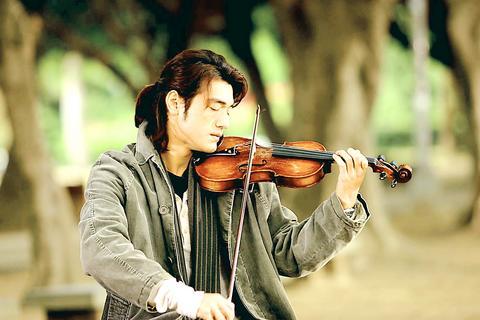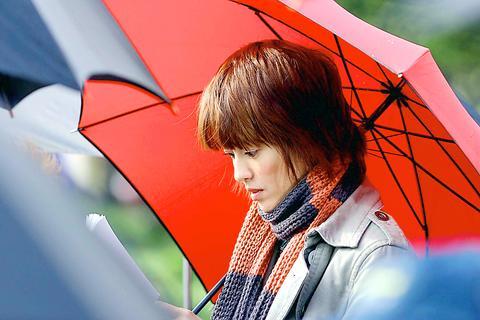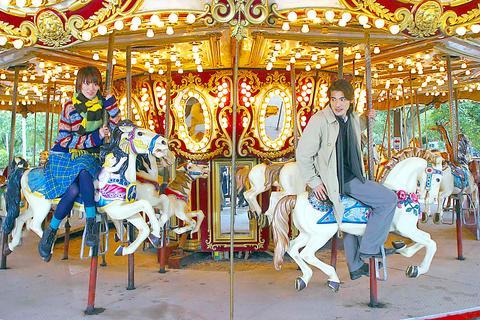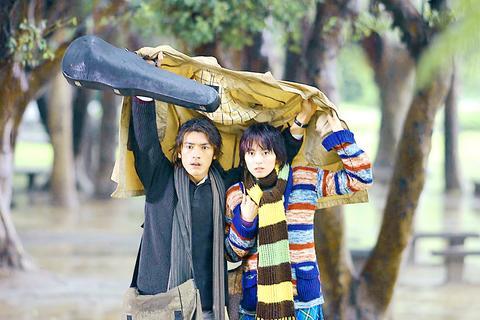Jimmy Liao's (
So, to adapt one of his stories into a movie, especially a romance drama, one needs to enrich the plot and create more characters, it might be thought.

Johnny To's Turn Left, Turn Right (

On the positive side, Takeshi Kaneshiro (
Kaneshiro plays a young violinist who lives alone in a Taipei apartment. He's a young talent who only gets to play cheesy tunes in restaurants and subway stations. Same for Leung, working in a publishing company, she likes the poems and novels of Polish writer W. Szymborska. But her boss has asked her to translate horror stories that give her constant nightmares.

PHOTOS COURTESY OF WARNER
The two loners are neighbors but do not know each other. Though they have never met, the audience is made aware that they both have a lot in common with each other. As such, they both wear cute Bohemian clothing with colorful wool hats and scarves. Each rides a bicycle and enjoys peddling around the city. They love art and literature, sitting in the park on a Sunday afternoon and playing with kids or dogs. Also, they both want to go abroad someday for better opportunities. More importantly, it seems, they have not met that someone they were destined to meet.

Like two parallel lines, they always pass each other. Taking elevators at the same time, she goes up and he goes down. They leave a building but take different turns. Taking the MRT, they each stand on on either side of the platform.
One day at a park by the fountain, the two lives finally converge. They chat as though they're old lovers who have been apart for a long time. He plays music for her and she teaches him Polish poems.
Then, he realizes that she was the girl he had a crush on in elementary school, that he remembers sitting on the horse of a merry-go-round, watching her back. Their first meeting goes really well, so they exchange their numbers and leave in the pouring rain, only to find out later that the numbers have smudged in the rain and are now unrecognizable.
The movie is faithful to the book in portraying conveying dream-like pictures and colors. The small Taipei apartments they live in are cute and fantastical. The MRT stations, the fountains in Beitou Park, Warner Village and Hsimenting all look pleasant. From a Hong Kong director's lens Taipei indeed looks lovely.
The biggest problem, however, is that the chemistry between Leung and Kaneshiro is not convincing, even though they look good together. Kaneshiro seems lost despite Leung's best efforts. From the way he looks at Leung and the way he talks to her, you get a dry feeling and it is hard to imagine how he could be suffering from losing her.
Turn Left, Turn Right intends to combine both To's Hong Kong-style chattering-style comedy and Liao's Taiwanese melancholy poetics, but fails to make a bridge over the divide. The result is that fans are left only half satisfied at the end.

The canonical shot of an East Asian city is a night skyline studded with towering apartment and office buildings, bright with neon and plastic signage, a landscape of energy and modernity. Another classic image is the same city seen from above, in which identical apartment towers march across the city, spilling out over nearby geography, like stylized soldiers colonizing new territory in a board game. Densely populated dynamic conurbations of money, technological innovation and convenience, it is hard to see the cities of East Asia as what they truly are: necropolises. Why is this? The East Asian development model, with

June 16 to June 22 The following flyer appeared on the streets of Hsinchu on June 12, 1895: “Taipei has already fallen to the Japanese barbarians, who have brought great misery to our land and people. We heard that the Japanese occupiers will tax our gardens, our houses, our bodies, and even our chickens, dogs, cows and pigs. They wear their hair wild, carve their teeth, tattoo their foreheads, wear strange clothes and speak a strange language. How can we be ruled by such people?” Posted by civilian militia leader Wu Tang-hsing (吳湯興), it was a call to arms to retake

This is a deeply unsettling period in Taiwan. Uncertainties are everywhere while everyone waits for a small army of other shoes to drop on nearly every front. During challenging times, interesting political changes can happen, yet all three major political parties are beset with scandals, strife and self-inflicted wounds. As the ruling party, the Democratic Progressive Party (DPP) is held accountable for not only the challenges to the party, but also the nation. Taiwan is geopolitically and economically under threat. Domestically, the administration is under siege by the opposition-controlled legislature and growing discontent with what opponents characterize as arrogant, autocratic

Desperate dads meet in car parks to exchange packets; exhausted parents slip it into their kids’ drinks; families wait months for prescriptions buy it “off label.” But is it worth the risk? “The first time I gave him a gummy, I thought, ‘Oh my God, have I killed him?’ He just passed out in front of the TV. That never happens.” Jen remembers giving her son, David, six, melatonin to help him sleep. She got them from a friend, a pediatrician who gave them to her own child. “It was sort of hilarious. She had half a tub of gummies,